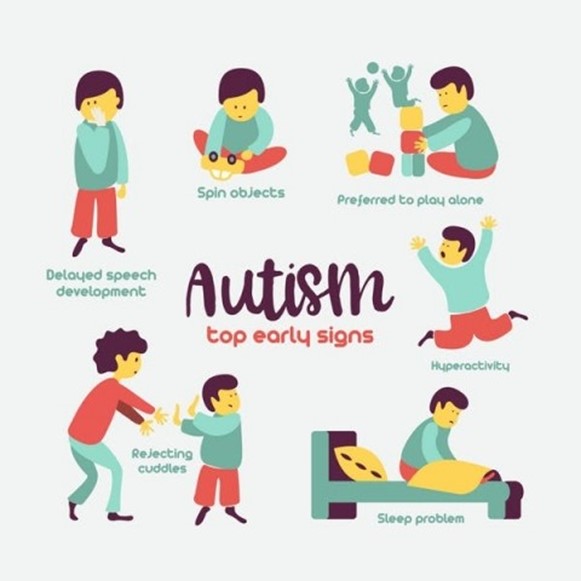The nurse is observing a group of 2- and 3-year-olds in a playgroup.
Which behavior noted in one of the children indicates to the nurse that the child may have autism spectrum disorder (ASD)?
After another child takes a toy, the child cries and stomps his feet.
A child playing in the kitchen area pretends to pour a glass of milk and repeats this over and over.
While the other children are eating a snack, the child walks around the room feeling the walls and ignores the caregiver who offers him a snack.
A child flips the light switch off and on until the caregiver asks her to stop and join the other children in play.
The Correct Answer is C
A child with autism spectrum disorder may have problems with social communication and interaction, including ignoring a caregiver who offers them a snack.
Choice A is incorrect because crying and stomping feet after another child takes a toy is normal behavior for a 2- or 3-year-old child.
Choice B is incorrect because repeating an action over and over is not necessarily indicative of autism spectrum disorder.
Choice D is incorrect because flipping a light switch off and on until asked to stop and join other children in playing is not necessarily indicative of autism spectrum disorder.

Nursing Test Bank
Naxlex Comprehensive Predictor Exams
Related Questions
Correct Answer is D
Explanation
Involution is the process by which the uterus returns to its nonpregnant size and function after delivery.
Choice A is not correct because evolution refers to the gradual development of something.
Choice B is not correct because decrement refers to a reduction in size or value.
Choice C is not correct because progression refers to the process of developing or moving gradually toward a more advanced state.
Correct Answer is C
Explanation
This is an antibiotic ointment that is applied to the eyes of newborns to prevent ophthalmia neonatorum, a serious eye infection caused by gonorrhea.
Ophthalmia neonatorum can cause blindness if left untreated and can occur even if the mother does not have symptoms of gonorrhea.
Erythromycin is the only drug approved by the FDA for this purpose and is mandated in most states.
Choice A.
Nystatin is incorrect, as this is an antifungal medication that is used to treat oral thrush or diaper rash in newborns, not eye infections.
Choice B.
Ceftriaxone is incorrect, as this is an antibiotic injection that is used to treat systemic gonorrhea infections in adults or newborns, not eye infections.
Choice D.
Ofloxacin is incorrect, as this is an antibiotic eye drop that is used to treat bacterial conjunctivitis in older children and adults, not ophthalmia neonatorum in newborns.
Therefore, choice C is the best answer to this question.

Whether you are a student looking to ace your exams or a practicing nurse seeking to enhance your expertise , our nursing education contents will empower you with the confidence and competence to make a difference in the lives of patients and become a respected leader in the healthcare field.
Visit Naxlex, invest in your future and unlock endless possibilities with our unparalleled nursing education contents today
Report Wrong Answer on the Current Question
Do you disagree with the answer? If yes, what is your expected answer? Explain.
Kindly be descriptive with the issue you are facing.
